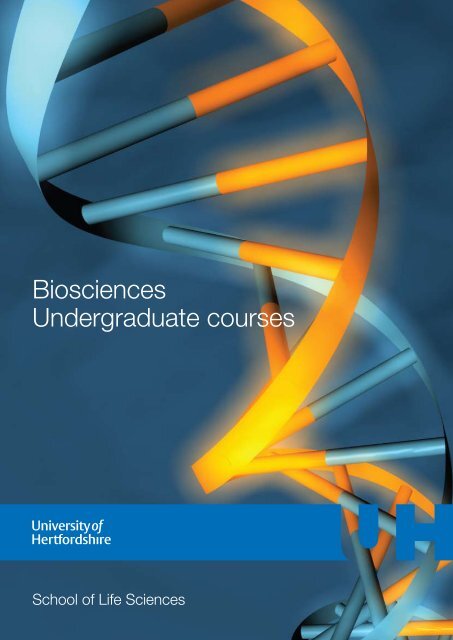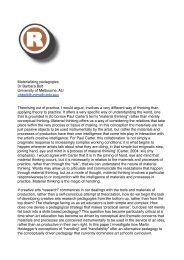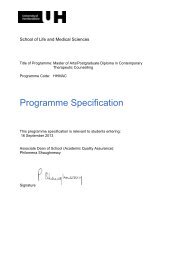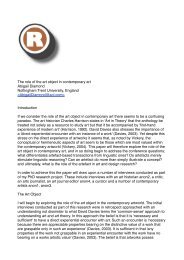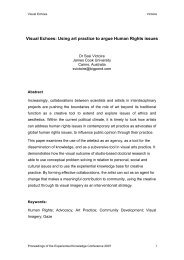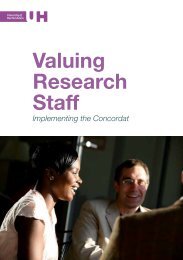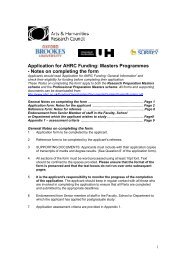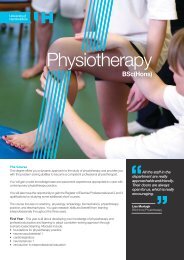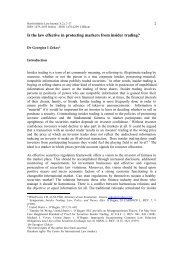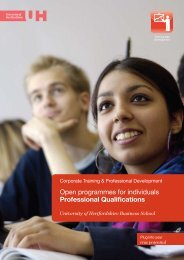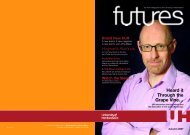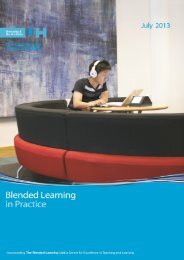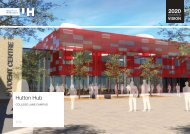Biosciences Undergraduate courses - University of Hertfordshire
Biosciences Undergraduate courses - University of Hertfordshire
Biosciences Undergraduate courses - University of Hertfordshire
Create successful ePaper yourself
Turn your PDF publications into a flip-book with our unique Google optimized e-Paper software.
<strong>Biosciences</strong><strong>Undergraduate</strong> <strong>courses</strong>School <strong>of</strong> Life Sciences1
ContentsAbout the School <strong>of</strong> Life Sciences 5Why study with us?Study facilities 8Accommodation 9Employability 10Study abroad 12Sports and social life 13Student support 15Financial support 16Our <strong>courses</strong>About our <strong>courses</strong> 19BSc (Hons) Biochemistry 20BSc (Hons) Biological Science 22BSc (Hons) Biomedical Science 24BSc (Hons) Biotechnology 26BSc (Hons) Molecular Biology & Genetics 28BSc (Hons) Pharmacology 30BSc (Hons) Physiology 32BSc (Hons) Pharmaceutical Science 34Joint Honours Programmes 36Welcome from Head <strong>of</strong> SchoolWelcome to the School <strong>of</strong> Life SciencesWelcome to the School <strong>of</strong> Life Sciences at the<strong>University</strong> <strong>of</strong> <strong>Hertfordshire</strong>, where we have along and successful reputation for providingbiosciences students with a high level <strong>of</strong>choice and breadth <strong>of</strong> expertise to securetheir interests and future.We ensure that all <strong>of</strong> our programmes have a strong practical element withsubstantial emphasis on laboratory work in up-to-date facilities. The subjectsstudied represent some <strong>of</strong> the newest, fastest growing areas <strong>of</strong> research.Whilst this is important we also feel that it is vital to ensure that you haveall round skills which employers feel are essential or desirable beyond thedegree course structure, such as design and creativity, problem solving,and communication skills.Furthermore, we <strong>of</strong>fer you the chance to undertake a work placement in theUK or abroad with some <strong>of</strong> the key employers in industry or the opportunityto study overseas at one <strong>of</strong> our partner institutions.Whatever your interest in the area <strong>of</strong> <strong>Biosciences</strong>, we are sure that ourcombination <strong>of</strong> high quality teaching with <strong>courses</strong> tailored to meet industrydemands will give you the kick start you need to build your career.Pr<strong>of</strong> Robert Slater BSc PhD FIBiol ILTMHead <strong>of</strong> School...we aresure that ourcombination<strong>of</strong> high qualityteachingwith <strong>courses</strong>tailored tomeet industrydemands willgive you thekick start youneed to buildyour career.The next stepHow to apply 38Find out more39Open days and campus tours 39Our location 40Equal Opportunities statement 412 3
About the schoolAbout <strong>Biosciences</strong>We have a number <strong>of</strong> undergraduate degree <strong>courses</strong> which cover the breadth<strong>of</strong> the biological sciences as detailed in this booklet. All our degree pathwaysare available as a four year work placement degree or with a Year in Europe/Year in North America. There is no obligation to do a work placement year butwe strongly advise students to do so because <strong>of</strong> the positive impact it has.We have strong links with the pharmaceutical industry and our students mayundertake their work placement year in industry, whilst staff with experiencein this sector also teach on our <strong>courses</strong>. We also have excellent links with theNational Health Service (NHS), enabling students to complete practical workin a hospital environment, undertake placements in hospital laboratories andreceive teaching and assessment from clinicians. This ensures that the content<strong>of</strong> our degree programmes is relevant and ‘up-to-date’, culminating in goodgraduate employment.Our Bioscience staff engage in ‘cutting-edge’ research, for example,understanding heart disease using stem cells, through to the biological activity<strong>of</strong> cannabinoids; whilst we are also engaged in developing entrepreneurshipin the biotechnology sector, through our own company led by a member <strong>of</strong>academic staff. This emphasis on research also ensures that undergraduateteaching is relevant and first rate.During your first year you will study a range <strong>of</strong> biological subjects thatcover all <strong>of</strong> the disciplines that you might want to study as a full degree.This foundation in biological sciences allows you to defer your choice<strong>of</strong> specialism until the end <strong>of</strong> the first year.Our committed staff provide a supportive pastoral approach whilst enablingyour academic growth and development. This is manifested through ourpersonal tutor system (a skills development programme), our work placementvisits, research project supervision and our links with schools and FE colleges.45
Why study with us?Study facilities 8Accommodation 9Employability 10Study abroad 12Sports and social life 13Student support 15Financial Support 1667
Study facilitiesAccommodationA 21st century universityFirst-class facilities support our world-class teaching. Our richly resourced,hi-tech learning environment gives you tremendous flexibility in how, whenand where you study.Our state-<strong>of</strong>-the-art LRCs are equipped with virtually everything you needto progress and present your coursework. Open 24/7, together they providea total <strong>of</strong> 2900 study places and 1500 computer workstations. Our CollegeLane centre, one <strong>of</strong> the largest in the UK, is also home to the <strong>University</strong>’sextensive collections <strong>of</strong> printed books and journals, and online resources.Services are exceptionally user-friendly, but self-help guides, helpdesksand telephone support are on hand to ensure you get the most out<strong>of</strong> them.All our undergraduate degrees contain a significant practical componentculminating in the final year research project. The emphasis on thedevelopment <strong>of</strong> practical skills requires the use <strong>of</strong> a full range <strong>of</strong> scientificequipment. Our microscopes have digital camera attachments enablingyou to take photographs <strong>of</strong> fungi and blood cells and our pharmacologylab has ‘state <strong>of</strong> the art’ IT equipment for measuring drug responses.The biochemistry and molecular biology facilities enable the measurement<strong>of</strong> enzyme activity, through to the isolation <strong>of</strong> DNA and its manipulation.Practical’s are designed to be relevant to current working practices andthe department provides short practical <strong>courses</strong> for industrial clients.StudyNet – your virtual learning environmentStudyNet is every student’s best friend. It enables youto study and communicate with the <strong>University</strong> and fellowstudents anytime, anywhere – on campus, from home,at work, or even on holiday.You will have your own <strong>University</strong> email address and internetaccess to all your own personalised course information– timetables, course materials, lecture notes, podcasts,discussion groups, study resources, library services,assessments and exam results.For a demo <strong>of</strong> StudyNet go tohttp://go.herts.ac.uk/studynetdemoA place to call homeHaving somewhere comfortable and secure to live will help you to settlequickly into your new life. As a first year student, you’re guaranteed a roomin <strong>University</strong> accommodation (you need to apply in good time and acceptyour course place by the appropriate qualifying date – 31 August for UK/EUstudents, and 6 September for international students).Living in a <strong>University</strong> hall is a great place to find your feet and make newfriends, and as we’re a campus <strong>University</strong>, you will be at the heart <strong>of</strong> our livelycommunity, and close to all study and social amenities.An option to suit youThere’s a variety <strong>of</strong> <strong>University</strong> accommodation to meet different tastes andbudgets. At our College Lane campus, where the Students’ Union is located,six purpose-built halls <strong>of</strong>fer fully-furnished, single study bedrooms with sharedbathrooms/showers, network connection and self-catering facilities. Whileour de Havilland campus, home to the <strong>Hertfordshire</strong> Sports Village, has1600 rooms in eleven halls – all with en-suite facilities, fridges andbroadband access, and shared use <strong>of</strong> well-equipped kitchens andspacious common rooms.For a more independent life <strong>of</strong>f campus, you may prefer to share a rentedproperty with other students or lodge with a local family. Either way, thereare plenty <strong>of</strong> options nearby and the <strong>University</strong> will help find the ideal placefor you.Planning your budgetDepending on the type <strong>of</strong> accommodation you choose you can expect to paybetween £65 and £102*. Please remember that you will need to pay a deposit,and that <strong>University</strong> accommodation fees are payable either in advance or bymonthly instalments for the full academic year, including Christmas and Eastervacations.*Prices subject to change. Please visit website for an up to date price list.Want to know more?Call Residential Allocationson +44 (0)1707 284071Email accommodation@herts.ac.ukGo to http://go.herts.ac.uk/accommodation8 9
EmployabilityFocusing on your futureLife is what you make it, but with a degree from the <strong>University</strong> <strong>of</strong> <strong>Hertfordshire</strong>you will have a head start in today’s challenging and competitive workplace.Whether your sights are set on climbing the corporate ladder, going it alonein your own business venture or perhaps doing voluntary work overseas, yourtime with us will help you achieve your ambitions. You will develop a multitude<strong>of</strong> skills – communication, decision-making, leadership, problem-solving,presentation, team-working, to name but a few – that are prized by employersand will empower you for success in any career or setting.In the <strong>Biosciences</strong> Programmes there is much support in place to developthose skills; from special modules in years 1 and 2, to the opportunity to geta full year’s work experience between years 2 and 3. A placement year is veryhighly valued by employers and will give you a strong edge in the graduatejob market. Throughout your studies you will have the chance to see whatjob possibilities you have with your chosen degree (including some surprisingones!) and hear what those jobs are like from the people who are doing them.A better futureYour degree also promises to make a big difference to your future lifestylechoices. Research shows that graduates earn significantly more than nongraduates– up to 50 per cent more – and are less likely to be unemployed.Around 90 per cent <strong>of</strong> our graduates are in full-time work or go on to furtherstudy shortly after qualifying.Unique work connectionWe’re the first UK university to incorporate a commercial business supportorganisation. With Business Link <strong>Hertfordshire</strong>’s team <strong>of</strong> more than 50 adviserson board, we’re directly connected to thousands <strong>of</strong> small and medium-sizedcompanies in the region and beyond. This unique position, together with ourties with many ‘blue-chip’ and multinational enterprises, opens doors for ourgraduates year after year.Supporting your career searchTo help you on your way, pr<strong>of</strong>essional advisers at the <strong>University</strong>’s nationallyaccredited Careers Service ‘Graduate Futures’ can put you in touch witha whole range <strong>of</strong> support that includes:• recruitment fairs, on and <strong>of</strong>f campus• expert advice and strategies for effective job-hunting• practical help with CVs, applications, job interviews and selection• access to Knowledge Transfer Partnerships (KTPs) with opportunitiesto contribute to real-life projects• online career planning tools and links to the best employment websitesSome <strong>of</strong> the companies our graduates have goneon to work for:Amersham PlcGlaxo Wellcomei2analyticalMany NHS TrustsMerck Sharp and DohmeNational Institute for Biological Standards and ControlPfizer LtdRestoration <strong>of</strong> Appearance and Function TrustRoche Products LtdWant to know more?Go to www.herts.ac.uk/careers“I met some lovely people and made some greatfriends. The course itself was demanding but extremelyinteresting. If you enjoy biology, this is the right coursefor you!”Natalie Bell, Human Physiology (BSc Hons), Graduated 2004 with First Class Honours10 11
Study AbroadSports and social lifeWiden your horizonsLiving and studying abroad for part <strong>of</strong> your degree course can be a lifechangingexperience. It builds valuable skills, improves your job prospects– and you will have fun.With more and more employers looking for graduates with internationalexperience and good linguistic skills, we encourage students to takeadvantage <strong>of</strong> overseas exchange opportunities.As well as gaining a fresh perspective on your chosen subject, you will havethe chance to travel, participate in different cultures, and maybe learn a newlanguage. Growing in confidence and independence, you will acquire a wholenew circle <strong>of</strong> friends and important contacts for your future career.Europe and beyondThrough the EU Socrates Erasmus scheme we have agreements with 60universities across Europe – many <strong>of</strong>fer <strong>courses</strong> taught in English. Dependingon your degree, you can spend between three months and one year on astudy exchange, possibly combining it with a work placement. This timecounts as part <strong>of</strong> your studies so you will receive full recognition towards yourqualification.If you want to spread your wings further, we have close links with 25universities in Australia, North America and Singapore.Whatever destination you choose, you will receive the <strong>University</strong>’s full support– including help with language learning if you need it – to make sure you getthe most out <strong>of</strong> the experience.Want to know more?Work hard, play hardThere’s much more to student life than study. At the <strong>University</strong> <strong>of</strong> <strong>Hertfordshire</strong>you will have the perfect environment to play as hard as you work.However you like to spend your spare time – the arts, clubbing or eatingout – there’s so much going on in and around the <strong>University</strong> that you will bespoilt for choice.On campusYour social life is likely to revolve around the Students’ Union, where after along day’s study you can chill out. Weekly club nights with top DJs, live gigswith international acts, a fantastic summer ball and much more throughoutthe year means you will never be bored. With over 50 specialist clubs andsocieties, there are non-stop opportunities to meet new friends, develop newleisure interests, or simply party the night away.If you’re a culture vulture, head for the Weston Auditorium on the de Havillandcampus where a packed programme <strong>of</strong> music, dance, theatre, comedy andvisual arts events is guaranteed to keep you entertained.The ForumThe Forum is a brand new £38 million entertainment development inpartnership with the Students’ Union. Situated on the College Lane campusit <strong>of</strong>fers a 2,000 capacity state-<strong>of</strong>-the-art entertainments venue including;style bar, mini club, balcony bar, main auditorium, restaurant, c<strong>of</strong>fee bar andconvenience shops.Off campusAn easy 10 minutes walk away is Hatfield’s Galleria with a 12-screen cinema,designer discount shopping, cafes and fast food outlets. Nearby, the city<strong>of</strong> St Albans <strong>of</strong>fers chic city pubs, sixteenth century coaching inns andthe historic cathedral where we hold the annual graduation ceremony.In less than half an hour by rail or road you can be in London – a shopper’sparadise, one <strong>of</strong> the world’s major cultural centres, and where die-hardclubbers can enjoy the buzz <strong>of</strong> capital city nightlife. But if the great outdoorsis more your thing, you will also find plenty <strong>of</strong> green open spaces andpicturesque villages in and around the county.Call the European and Study Abroad Officeon +44 (0)1707 285417Email studyabroad@herts.ac.ukGo to http://go.herts.ac.uk/studyabroad12 13
Student supportBe activeStudy aside, your time with us provides a fantastic opportunity to play andenjoy a whole range <strong>of</strong> indoor and outdoor sports at some <strong>of</strong> the country’smost impressive facilities.Everyone is welcome at the brand new £15 million <strong>Hertfordshire</strong> Sports Villageon the de Havilland campus, which is home toover 25 different sporting clubs.Get involvedThere are activities and classes to suit all interests and abilities, whether youwant to compete at club level or simply participate for fun and good health.Sport for allWith discounted student membership packages, and many pay and playoptions, the Sports Village <strong>of</strong>fers excellent value for money and real flexibility,whether you’re a regular or occasional user.Facilities include:• a 110-station health and fitness centre, with the latestTechnogym equipment• 25-metre 8-lane indoor pool• 12 court sports hall (badminton, basketball, netball, volleyball,indoor football)• 12-metre high climbing wall• 4 net indoor cricket hall• 4 UEFA standard grass pitches• 2 ‘New Generation’ floodlit artificial turf pitches (football and rugby)• 2 hard courts (tennis, netball, 5-a-side football)• 2 squash courtsHere to helpStarting university is an exciting time, yet as you adjust to a new culture androutine there may be occasions when you need practical help and information,or simply a listening ear.Finding somewhere to live or a part-time job… applying for a student loan ormanaging your finances… or perhaps you’re anxious about exams, or missingfriends and family back home – whatever the problem we’re here to help. We<strong>of</strong>fer a wide range <strong>of</strong> support services to look after your academic and personalinterests, including:Chaplaincy – the <strong>University</strong>’s chaplain can put you in touch with a particularfaith community and our multicultural centre, The Key Centre, provides students<strong>of</strong> all faiths, or no faith, with a peaceful place to worship, reflect and talk aboutspiritual matters.Childcare – our registered day nursery provides pr<strong>of</strong>essional care andeducation for children between three months and five years. Demandis high so apply early to secure a place.Counselling – confidential and free guidance from qualified counsellorscan put a fresh perspective on issues that concern you and help you findthe solutions.Healthcare – a fully equipped medical centre on campus, staffed byexperienced GPs and practice nurses, <strong>of</strong>fers regular surgeries for adviceand treatment.You will find an A-Z guide <strong>of</strong> all our services on the <strong>University</strong>’s website,or you can pick up a printed copy on arrival.Nearby you will also find excellent indoor tennis centres, athletics tracks andgolf <strong>courses</strong>, where, if you’re a budding Roger Federer, Kelly Holmes or TigerWoods, you can perfect your performance.Want to know more?Want to know more?Call us on +44 (0)1707 284466Go to www.student.hertssportsvillage.co.ukCall The Office <strong>of</strong> the Dean <strong>of</strong> Studentson +44 (0)1707 284451Email dean<strong>of</strong>students@herts.ac.ukGo to http://go.herts.ac.uk/studentsupport14 15
Financial supportGoing to university is an important investment in your future. To support you infinancing your study, the <strong>University</strong> <strong>of</strong> <strong>Hertfordshire</strong> <strong>of</strong>fers a generous system<strong>of</strong> non-repayable scholarships bursaries and college awards which manystudents will benefit from.Science and engineering scholarships UK/EUFull-time applicants from the UK or EU who gain currently at least 280 UCASpoints, receive an <strong>of</strong>fer from UH and accept a place on Year 1 <strong>of</strong> one <strong>of</strong> thespecified degree programmes.A scholarship <strong>of</strong> £1,000 per year is awarded for the first two years and £500for each subsequent year, as long as necessary academic standards arereached. BSc / BEng students receive £2,500 in total and MEng / MPhysstudents receive £3,000 in total. Eligible students who have been funded inyear 1 under the Chancellor’s Scholarship scheme will transfer to the Scienceand Engineering Scholarship scheme for subsequent years.Our CoursesBSc (Hons) Biochemistry 20BSc (Hons) Biological Science 22BSc (Hons) Biomedical Science 24BSc (Hons) Biotechnology 26BSc (Hons) Molecular Biology & Genetics 28BSc (Hons) Pharmacology 30BSc (Hons) Physiology 32BSc (Hons) Pharmaceutical Science 34You must register with www.studentfinancedirect.co.uk and receive an ARTID/Student Support Number to enable us to pay any bursary or scholarshipto which you may be entitled.If you have any queries you should contactwww.studentfinancedirect.co.ukFor more information please visit http://go.herts.ac.uk/fees16 17
About our <strong>courses</strong>Choosing the right courseBiology is a study <strong>of</strong> life at all levels, from molecules and organelles to wholeorganisms. On our degree <strong>courses</strong>, you will gain the technical, analyticaland practical skills you need to investigate biological phenomena inmicroorganisms, plants, human beings and other animals.By studying for one <strong>of</strong> our degrees, you’ll gain a sound foundation in all themajor aspects <strong>of</strong> biological theory, techniques and practice. You can opt for athorough and broad education in a biological Science, or choose to focus onareas <strong>of</strong> particular interest, studying a degree in a specialist area. You’ll makeyour final decision at the end <strong>of</strong> your First year when you’ve developed anappreciation <strong>of</strong> the specialist areas open to you. Please do note that due to thestrong chemistry elements in both the Biochemistry and the PharmaceuticalScience degrees, you must have studied chemistry to at least AS level.All <strong>of</strong> our biology degrees aim to provide up-to-date, stimulating education thatmeets the current and future needs <strong>of</strong> employers in the biosciences sector.We’re based at the heart <strong>of</strong> the UK biosciences industry, providing a greatdeal <strong>of</strong> training for international companies – this commercial experience feedsdirectly back into our <strong>courses</strong>. Lectures are supported by workshops and anadvanced practical programme. You’ll graduate with a full complement <strong>of</strong> thepersonal and pr<strong>of</strong>essional skills sought by employers, including IT, presentationskills and experience <strong>of</strong> teamwork.Extended DegreesIf you are keen to study a science degree you should not be discouraged by alack <strong>of</strong> normal entry qualifications. You may still be able to take the course youwant by applying for an extended degree.The initial year, taught at North <strong>Hertfordshire</strong> College, contains an introductionto the fundamental sciences, quantitative methods and study skills necessaryfor the subsequent years <strong>of</strong> the degree you choose. Your degree studiescontinue at the <strong>University</strong> <strong>of</strong> <strong>Hertfordshire</strong> and your choice <strong>of</strong> degree can bereviewed and transferred to another science degree programme if you prefer.For students with a broader experience <strong>of</strong> the real world, direct entry ontodegree programmes may be available depending on the relevance <strong>of</strong> your lifeexperiences to the degree path that you wish to pursue.1819
BSc (Hons) BiochemistryUCAS Code: C1CR BSc/BiocEurope: C701 BSc/BiocEuNorth America: C702 BSc/BiocNAUH Programme Code: HHBIOEntry Requirements: 240 UCAS pointsincorporating 2 science GCE A Levels includingbiology and/or chemistry, a minimum AS levelin Chemistry is required; plus GCSE English,mathematics and dual science award (or biologyand chemistry) at grade C or above. A minimumIELTS score <strong>of</strong> 6.0, TOEFL 550 (213CBT) isrequired if English is not your first language.Equivalent qualifications welcome.Study Routes: Full-time 3 years, Sandwich 4years, Part-time normally 5 yearsStart dates: SeptemberLocation: College LaneScholarships: Science and EngineeringPr<strong>of</strong>essional Accreditations: Eligible forgraduate membership <strong>of</strong> the Institute <strong>of</strong> Biology.Associate Membership <strong>of</strong> the Royal Society <strong>of</strong>Chemistry.Programme Tutor name: Dr Kate Graeme-CookWeb address: http://go.herts.ac.uk/c1crBiochemistry is the study <strong>of</strong> the fundamentalprocesses <strong>of</strong> life. Biochemists seek to answerquestions about life events, health and disease, thenatural environment, materials and compounds,using scientific techniques developed in chemistryand biology. From an initial grounding in chemistry,genetics, cell biology, microbiology and humanphysiology, you will progress to an understanding <strong>of</strong>the complex biochemical processes that form thebasis <strong>of</strong> life. You will also need AS level chemistry forthis degree.Year oneFirst year modules provide you with a solid foundationin key aspects <strong>of</strong> biology and chemistry. You willlearn to use a range <strong>of</strong> experimental techniques andanalytical tools in practice as well as in theory. Youwill also develop skills such as word processing, dataevaluation and presentation.you to find a placement relevant to your specialism.Placements are usually for one year, but may consist<strong>of</strong> two six month periods. They are mainly located inthe UK, but sometimes overseas. Recent placementshave included government and charity fundedresearch institutions, the biotechnology industry,healthcare companies, agrochemical, pharmaceuticaland biosciences companies and environmentalagencies.Year in Europe or North America (optional)You can choose to study your degree ‘with a year inEurope’ or ‘with a year in North America’, and spendyour placement year at one <strong>of</strong> our partner institutionsin Europe or North America. This can help developyour language skills as well as giving you the chanceto learn new approaches and techniques which maydiffer from the UK.Final YearYour studies will focus on core aspects <strong>of</strong>biochemistry along with studying the processescontrolling how complex organisms develop and howbiochemistry is applied in pharmaceutical synthesis.Your individual research project on a biochemistrytopic, with staff support, is a key element <strong>of</strong> yourfinal year.Modules include:Research ProjectAdvanced BiochemistryCellular Differentiation & DevelopmentPharmaceutical Synthesis, Production & AnalysisFor further information, and to downloaddetailed module descriptions visit:http://go.herts.ac.uk/c1crModules include:Introduction to Biochemistry, Microbiology &PharmacologyMolecular Structure & ReactivityMolecular Biology & GeneticsCell Biology & DevelopmentHuman PhysiologyOn this programme you will study thebiochemical processes that form the basis<strong>of</strong> life and new discoveries in biosciences.You will discover how biochemistry affectsthe quality <strong>of</strong> our lives, from the discovery<strong>of</strong> new drugs and the design <strong>of</strong> new medicaltreatments, to the industrialisation <strong>of</strong>laboratory processes. Our links with industryprovide you with fantastic opportunities togain valuable experience in the biosciencesindustry during the placement year.Year twoIn year two you’ll specialise in biochemistry andstudy an array <strong>of</strong> core modules which will expandyour knowledge <strong>of</strong> chemistry and molecular biology.This year also includes a research methods modulewhich helps you prepare for your final year project .Placement preparation is <strong>of</strong>fered for the optional workexperience year.Modules include:BiochemistryAnalytical ScienceMolecular Cell BiologyMolecular Structure & Synthesis<strong>Biosciences</strong> Research MethodsPrinciples <strong>of</strong> ImmunologyPlacement Year (optional)Placement year students will spend a year betweenthe second and final years on a supervised workplacement, which can give you an extra qualification- the Licentiateship <strong>of</strong> the City and Guilds Institute.You might be employed in any <strong>of</strong> a range <strong>of</strong> biologicalindustries and research organisations. We will help20 21
BSc (Hons) Biological ScienceUCAS Code: C902 BSc/BiosEurope: C901 BSc/BiosEuNorth America: C900 BSc/BiosNAUH Programme Code: HHBIOEntry Requirements: 240 points incorporating2 science GCE A Levels including biology and/orchemistry; plus GCSE English, mathematics anddual science award (or biology and chemistry)at grade C or above. A minimum IELTS score <strong>of</strong>6.0, TOEFL 550 (213CBT) is required if English isnot your first language. Equivalent qualificationswelcome.Study Routes: Full-time 3 years, Sandwich 4years, Part-time normally 5 yearsStart dates: SeptemberLocation: College LaneScholarships: Science and EngineeringPr<strong>of</strong>essional Accreditations: Eligible forgraduate membership <strong>of</strong> the Institute <strong>of</strong> Biology.Programme Tutor name: Dr. Kate Graeme-CookWeb address: http://go.herts.ac.uk/c902This degree <strong>of</strong>fers you the opportunity tostudy a broad range <strong>of</strong> areas in biologicalscience. In addition to core studies in biologyyou can study specialist modules associatedwith the specialist degrees. The first yearprovides you a solid foundation in the keyareas <strong>of</strong> biology. This enables you to makean informed decision as to which areas youwould like to study in more depth.Biological Science incorporates the core elements <strong>of</strong>biology along with more specialised modules. If youare interested in broader aspects <strong>of</strong> biology, or if youare undecided on which aspects <strong>of</strong> biology you wouldlike to study, then this degree <strong>of</strong>fers you flexibility.By the end <strong>of</strong> your first year you will have a solidfoundation in several aspects <strong>of</strong> biological science andcan opt for a more specialised degree, or continuewith a range <strong>of</strong> subject areas.Year oneFirst year modules provide you with a solid foundationin key aspects <strong>of</strong> biology and chemistry. You willlearn to use a range <strong>of</strong> experimental techniques andanalytical tools in practice as well as in theory. Youwill also develop skills such as word processing, dataevaluation and presentation.Modules include:Introduction to Biochemistry, Microbiology &Pharmacology* Molecular Structure & Reactivity or Chemistry forBioscienceMolecular Biology & GeneticsCell Biology & DevelopmentHuman Physiology* required for future chemistry-based modules.Year twoYou study a range <strong>of</strong> optional modules alongsidesome core modules, one <strong>of</strong> which will prepare youfor your final year project. Your choice <strong>of</strong> moduleswill influence your modules options in year 3. Notethat timetabling may exclude certain combinations.Placement preparation is <strong>of</strong>fered for the optional workexperience year.Modules you may choose from include:Molecular Cell Biology (core)Bioscience Research Methods (core)Microbial Disease & Immunology or Principles<strong>of</strong> ImmunologyMicrobial Physiology & GeneticsBiochemistryBiomedical SciencePathophysiologyExercise PhysiologyPharmacology & Therapeutics* Molecular Structure & Synthesis (requires MolecularStructure & Reactivity at level 1).Placement Year (optional)Placement year students will spend a year betweenthe second and final years on a supervised workplacement, which can give you an extra qualification- the Licentiateship <strong>of</strong> the City and Guilds Institute.You might be employed in any <strong>of</strong> a range <strong>of</strong> biologicalindustries and research organisations. We will helpyou to find a placement relevant to your specialism.Placements are usually for one year, but may consist<strong>of</strong> two six month periods. They are mainly located inthe UK, but sometimes overseas. Recent placementshave included government and charity fundedresearch institutions, the biotechnology industry,healthcare companies, agrochemical, pharmaceuticaland biosciences companies and environmentalagencies.Year in Europe or North America (optional)You can choose to study your degree ‘with a year inEurope’ or ‘with a year in North America’, and spendyour placement year at one <strong>of</strong> our partner institutionsin Europe or North America. This can help developyour language skills as well as giving you the chanceto learn new approaches and techniques which maydiffer from the UK.Year threeThe key feature <strong>of</strong> this year is your individual researchproject. This will be carried out with the support <strong>of</strong> amember <strong>of</strong> the biosciences staff. The range <strong>of</strong> projects<strong>of</strong>fered is wide, but typically you would undertake aproject related to one <strong>of</strong> your year 3 modules. Notethat your choice <strong>of</strong> modules will be influenced by yourstudies in year 2. This will have been discussed withyou prior to making your level 2 choices.Modules you may choose from include:Research Project (core)Advanced BiochemistryCellular Differentiation & DevelopmentCellular & Molecular PathologyClinical Biochemistry & PathophysiologyClinical Immunology & Microbial PathogenesisEnvironmental BiotechnologyIndustrial BiotechnologyMolecular MedicineNeurophysiologyBiomedical Implications <strong>of</strong> ExercisePharmaceutical Synthesis, Production & AnalysisDrug Discovery, Design, Formulation & DeliveryTherapeutic PharmacologyTranslation <strong>of</strong> Science into MedicinesFor further information, and to downloaddetailed module descriptions visit:http://go.herts.ac.uk/c90222 23
BSc (Hons) Biomedical ScienceUCAS Code: B990 Bsc/BSciEurope: B991 BSc/BSEurNorth America: B992 BSc/BSNAUH Programme Code: HHBIOEntry Requirements: Entry Requirements: 240points incorporating 2 science GCE A Levelsincluding biology and/or chemistry; plus GCSEEnglish, mathematics and dual science award(or biology and chemistry) at grade C or above.A minimum IELTS score <strong>of</strong> 6.0, TOEFL 550(213 CBT) is required if English is not your firstlanguage. Equivalent qualifications welcomed.Study Routes: Full-time 3 years, Sandwich 4years, Part-time normally 5 yearsStart dates: SeptemberLocation: College LaneScholarships: Science and EngineeringPr<strong>of</strong>essional Accreditations: Degree isaccredited by the Institute <strong>of</strong> BiomedicalScience. Eligible for graduate membership <strong>of</strong> theInstitute <strong>of</strong> BiologyProgramme Tutor name: Dr. Kate Graeme-CookWeb address: http://go.herts.ac.uk/b990This degree involves the study <strong>of</strong> thecauses, diagnosis and treatment <strong>of</strong> diseasesthat affect humans. You will investigatethe processes involved in major diseasesincluding cancer, cardiovascular disease,blood disorders, respiratory diseases,biochemical and endocrine disorders andinfectious diseases. Our links with localhospitals means you will gain a valuableinsight into the workings <strong>of</strong> a busy pathologylaboratory through regular visits and theopportunity to do a placement year.This study programme is designed to provide youwith an understanding <strong>of</strong> the causes, diagnosis andtreatment <strong>of</strong> human diseases. You will graduate with aknowledge <strong>of</strong> the pathogenesis <strong>of</strong> disease andhow disease disrupts the normal function <strong>of</strong> thehuman body.Each module within the programme involves a series<strong>of</strong> lectures which are underpinned by workshopsand an extensive practical element. The first yearprovides a strong foundation in key aspects <strong>of</strong> biologyand chemistry relevant to all students <strong>of</strong> biologicalsciences. The programme develops more specialisedareas <strong>of</strong> biomedical science in the subsequent yearswith an emphasis on haematology, pathophysiology,clinical microbiology, immunology, biochemistry,endocrinology and analytical science. In addition,clinical-based research projects and relevant workplacements will be <strong>of</strong>fered in the latter part <strong>of</strong> theprogramme.Year oneYour first year will give you a strong grounding in keyaspects <strong>of</strong> biology and chemistry, with modules - allfeaturing a strong practical component- in humanphysiology, cell biology and development, molecularbiology and genetics, biochemistry, microbiology andpharmacology, and chemistry.Modules include:Human PhysiologyCell Biology & DevelopmentMolecular Biology & GeneticsIntroduction to Biochemistry, Microbiology &PharmacologyChemistry for Bioscience or Molecular Structure &ReactivityYear twoYour studies will cover the theme <strong>of</strong> diseasethrough specialised modules. This will give you anunderstanding <strong>of</strong> the mechanisms <strong>of</strong> diseases inhumans and diagnostic approaches to their detection.In addition, you will begin preparation for your finalyear research project. Placement preparation is<strong>of</strong>fered for the optional work experience yearModules include:Biomedical SciencePathophysiologyMicrobial Disease & ImmunologyMolecular Cell BiologyBioscience Research MethodsPlacement Year (optional)Placement year students will spend a year betweenthe second and final years on a supervised workplacement, which can give you an extra qualification- the Licentiateship <strong>of</strong> the City and Guilds Institute.Biomedical Science students who wish to obtainregistration with the Health Pr<strong>of</strong>essions Council mayuse the sandwich year in order to work towardscompletion <strong>of</strong> a portfolio <strong>of</strong> competences. Thisportfolio is required for registration as a BiomedicalScientist and allows you to work as a BiomedicalScientist within the NHS pathology services.Alternatively you might be employed in any <strong>of</strong> a range<strong>of</strong> biological industries and research organisations.We will help you to find a placement relevant to yourspecialism. Placements are usually for one year,but may consist <strong>of</strong> two six month periods. They aremainly located in the UK, but sometimes overseas.Recent placements have included government andcharity funded research institutions, the biotechnologyindustry, healthcare companies, agrochemical,pharmaceutical and biosciences companies andenvironmental agencies.Year in Europe or North America (optional)You can choose to study your degree ‘with a year inEurope’ or ‘with a year in North America’, and spendyour placement year at one <strong>of</strong> our partner institutionsin Europe or North America. This can help developyour language skills as well as giving you the chanceto learn new approaches and techniques which maydiffer from the UK.Year threeThe emphasis this year is on the pathogenesis,treatment and prevention <strong>of</strong> disease. You will studyseveral specialist areas <strong>of</strong> biomedical science andundertake an individual research project in arelated area.Modules include:Research ProjectClinical Immunology & Microbial PathogenesisCellular & Molecular PathologyClinical Biochemistry & PathophysiologyFor further information, and to downloaddetailed module descriptions visit:http://go.herts.ac.uk/b99024 25
BSc (Hons) BiotechnologyUCAS Code: C1J7 BSc/BiotEurope: J701 BSc/BiotEuNorth America: J702 BSc/BiotNAUH Programme Code: HHBIOEntry Requirements: 240 points incorporating2 science GCE A Levels including biology and/orchemistry; plus GCSE English, mathematics anddual science award (or biology and chemistry)at grade C or above. A minimum IELTS score <strong>of</strong>6.0, TOEFL 550 (213CBT) is required if English isnot your first language. Equivalent qualificationswelcome.Study Routes: Full-time 3 years, Sandwich 4years, Part-time normally 5 yearsStart dates: SeptemberLocation: College LaneScholarships: Science and EngineeringPr<strong>of</strong>essional Accreditations: Eligible forgraduate membership <strong>of</strong> the Institute <strong>of</strong> Biology.Programme Tutor name: Dr. Kate Graeme-CookWeb address: http://go.herts.ac.uk/c1j7On this degree you will gain specialistexpertise in applying biochemistry, molecularbiology and microbiology to industrialsituations. The skills <strong>of</strong> Biotechnologistsare needed in many industries such asin agriculture, in researching medicines,in creating fabrics, in the production <strong>of</strong>processed foods. Our links with industryprovide you with fantastic opportunities togain valuable experience in the biosciencesindustry during the placement year. Thisgives biotechnology students a furtherunderstanding <strong>of</strong> how their specialist skillsare used in the industryBiotechnology is the use <strong>of</strong> microorganisms, plantand animal cells, cellular organelles or enzymes toproduce a commercial product or perform a process.There is a demand from industry for scientists who areable to apply their science to a specific and technicalunderstanding <strong>of</strong> a commercial process. The BScBiotechnology degree gives you a sound grounding inbiochemistry, molecular biology and microbiology, andthe application <strong>of</strong> these areas to the industry.You gain an understanding <strong>of</strong> the biochemistry,genetics and physiology <strong>of</strong> the organisms involvedin industrial and environmental biotechnology, usingour new, state-<strong>of</strong>-the-art microbiology and molecularbiology laboratories.Year oneFirst year modules provide you with a solid foundationin key aspects <strong>of</strong> biology and chemistry. You willlearn to use a range <strong>of</strong> experimental techniques andanalytical tools in practice as well as in theory. Youwill also develop skills such as word processing, dataevaluation and presentation.Modules include:Introduction to Biochemistry, Microbiology &PharmacologyMolecular Structure & Reactivity or Chemistryfor BioscienceMolecular Biology & GeneticsCell Biology & DevelopmentHuman PhysiologyYear twoThis year <strong>of</strong>fers you specialist studies in biotechnology,in particular key aspects <strong>of</strong> microbial physiology,genetics and virulence, along with core studies inmolecular biology. This year also includes a researchmethods module which helps you prepare for yourfinal year project. Placement preparation is <strong>of</strong>fered forthe optional work experience year.Modules include:Microbial Disease & ImmunologyMicrobial Physiology & GeneticsMolecular Cell BiologyBioscience Research MethodsBiochemistryPlacement Year (optional)Placement year students will spend a year betweenthe second and final years on a supervised workplacement, which can give you an extra qualification- the Licentiateship <strong>of</strong> the City and Guilds Institute.You might be employed in any <strong>of</strong> a range <strong>of</strong> biologicalindustries and research organisations. We will helpyou to find a placement relevant to your specialism.Placements are usually for one year, but may consist<strong>of</strong> two six month periods. They are mainly located inthe UK, but sometimes overseas. Recent placementshave included government and charity fundedresearch institutions, the biotechnology industry,healthcare companies, agrochemical, pharmaceuticaland biosciences companies and environmentalagencies.Year in Europe or North America (optional)You can choose to study your degree ‘with a year inEurope’ or ‘with a year in North America’, and spendyour placement year at one <strong>of</strong> our partner institutionsin Europe or North America. This can help developyour language skills as well as giving you the chanceto learn new approaches and techniques which maydiffer from the UK.Year threeYour studies include specialist modules on the appliedaspects <strong>of</strong> the discipline, namely the exploitation<strong>of</strong> microorganisms in industrial and environmentalbiotechnology. You will carry out an individual researchproject with staff support on a biotechnology topic.Recent projects range from gene cloning to appliedmicrobiology and enzymology.Modules include:Research ProjectIndustrial BiotechnologyEnvironmental BiotechnologyCellular Differentiation & DevelopmentFor further information, and to downloaddetailed module descriptions visit:http://go.herts.ac.uk/c1j726 27
BSc (Hons) Molecular Biology & GeneticsUCAS Code: C1C7 BSc/MBEuEurope: C721 BSc/MBEuNorth America: C722 BSc/MBNAUH Programme Code: HHBIOEntry Requirements: 240 points including 2science GCE A Levels including biology and/orchemistry. Plus GCSE english, mathematics anddual science award (or biology and chemistry)at grade C or above. A minimum IELTS score <strong>of</strong>6.0, TOEFL 550 (213CBT) is required if English isnot your first language. Equivalent qualificationswelcome.Study Routes: Full-time 3 years, Sandwich 4years, Part-time normally 5 yearsStart dates: SeptemberLocation: College LaneScholarships: Science and EngineeringPr<strong>of</strong>essional Accreditations: Eligible forgraduate membership <strong>of</strong> the Institute <strong>of</strong> Biology.Programme Tutor name: Dr. Kate Graeme-CookWeb address: http://go.herts.ac.uk/c1c7This degree is designed to give you specialisttheoretical and practical experience inthe analysis <strong>of</strong> nucleic acids and proteinsallowing you to work in one <strong>of</strong> the fastestgrowing fields <strong>of</strong> biology. You will developan understanding <strong>of</strong> the function <strong>of</strong> genesand the manipulation <strong>of</strong> cells for proteinproduction and gene therapy, to helpovercome genetic diseases for example.Our links with industry also provide youwith fantastic opportunities to gain valuableexperience in the biosciences industry duringthe placement year.Now that scientists can both read and alter the DNAsequence, a new era has arrived in which organismscan be investigated at their most fundamental level.We can alter their genetic material to understand indetail the function <strong>of</strong> genes or to manipulate cellsfor protein production or gene therapy. The BScMolecular Biology and Genetics is designed toprovide specialist theoretical and practical experience<strong>of</strong> gene manipulation and the analysis <strong>of</strong> nucleic acidsand proteins.Year oneFirst year modules provide you with a solid foundationin key aspects <strong>of</strong> biology and chemistry. You willlearn to use a range <strong>of</strong> experimental techniques andanalytical tools in practice as well as in theory. Youwill also develop skills such as word processing, dataevaluation and presentation.Modules include:Molecular Biology & GeneticsCell Biology & DevelopmentIntroduction to Biochemistry, Microbiology &PharmacologyMolecular Structure & Reactivity or Chemistryfor BioscienceHuman PhysiologyYear twoYou will study a number <strong>of</strong> core aspects <strong>of</strong> molecularbiology relevant to all aspects <strong>of</strong> biology, from thehumble bacteria to the more complex organisms.This year also includes a research methods modulewhich helps you prepare for your final year project.Placement preparation is <strong>of</strong>fered for the optional workexperience year.Modules include:Molecular Cell BiologyMicrobial Physiology & GeneticsMicrobial Disease & ImmunologyBiochemistryBioscience Research MethodsPlacement Year (optional)Placement year students will spend a year betweenthe second and final years on a supervised workplacement, which can give you an extra qualification- the Licentiateship <strong>of</strong> the City and Guilds Institute.You might be employed in any <strong>of</strong> a range <strong>of</strong> biologicalindustries and research organisations. We will helpyou to find a placement relevant to your specialism.Placements are usually for one year, but may consist<strong>of</strong> two six month periods. They are mainly located inthe UK, but sometimes overseas. Recent placementshave included government and charity fundedresearch institutions, the biotechnology industry,healthcare companies, agrochemical, pharmaceuticaland biosciences companies and environmentalagencies.Year in Europe or North America (optional)You can choose to study your degree ‘with a year inEurope’ or ‘with a year in North America’, and spendyour placement year at one <strong>of</strong> our partner institutionsin Europe or North America. This can help developyour language skills as well as giving you the chanceto learn new approaches and techniques which maydiffer from the UK.Year threeIn this year, you will carry out an individual researchproject which may relate to a current research areain the school. Recent final year projects titles haveincluded DNA fingerprinting and genetic epidemiology,the study <strong>of</strong> recombinant enzymes and therapeuticantibodies <strong>of</strong> value to industry and medicine, andstudying the molecular biology <strong>of</strong> diabetes.Modules include:Research ProjectMolecular MedicineCellular Differentiation & DevelopmentAdvanced Biochemistry or Clinical Immunology &Microbial PathogenesisFor further information, and to downloaddetailed module descriptions visit:http://go.herts.ac.uk/c1c728 29
BSc (Hons) PharmacologyUCAS Code: C1B2 BSc/PharmEurope: B211 BSc/PharmEuNorth America: B212 BSc/PharmNAUH Programme Code: HHBIOEntry Requirements: 240 points incorporating2 science GCE A Levels, including biology and/or chemistry. Plus GCSE English, mathematicsand dual science award (or biology andchemistry) at grade C or above. A minimumIELTS score <strong>of</strong> 6.0, TOEFL 550 (213CBT) isrequired if English is not your first language.Equivalent qualifications welcome.Study Routes: Full-time 3 years, Sandwich 4years, Part-time normally 5 yearsStart dates: SeptemberLocation: College LaneScholarships: Science and EngineeringPr<strong>of</strong>essional Accreditations: Eligible forgraduate membership <strong>of</strong> the Institute <strong>of</strong>Biology.Programme Tutor: Dr. Kate Graeme-CookWeb address: http://go.herts.ac.uk/c1b2The pharmacology degree covers all aspects<strong>of</strong> drugs and their uses as medicines. Youwill discover how new drugs are discoveredand tested and understand the reasonsfor their effectiveness in treating disease.You will also gain an appreciation <strong>of</strong> whynew drugs are needed and how they canbe developed to treat illness better. Ourlinks with major Pharmaceutical companiesin the industry will provide you with theopportunity to gain valuable experiencein the pharmaceutical industry during theplacement year.The massive research expenditure <strong>of</strong> Britain’spharmaceutical companies, and the fiercecompetition in the field, ensures a continual demandfor well trained pharmacology graduates. This degreewill give you a thorough grounding in pharmacology.You will gain an advanced knowledge <strong>of</strong> the design,mechanism <strong>of</strong> action, breakdown, and potential toxiceffects <strong>of</strong> drugs used in the treatment <strong>of</strong> disease, andthe design <strong>of</strong> new drugs.Year oneFirst year modules provide you with a solid foundationin key aspects <strong>of</strong> biology and chemistry. You willlearn to use a range <strong>of</strong> experimental techniques andanalytical tools in practice as well as in theory. Youwill also develop skills such as word processing, dataevaluation and presentation.Modules include:Introduction to Biochemistry, Microbiology& PharmacologyMolecular Structure & Reactivity or Chemistry forBioscienceCell Biology & DevelopmentMolecular Biology & GeneticsHuman PhysiologyYear twoYou will develop your knowledge <strong>of</strong> howpharmacological substances interact with bodysystems. This is complemented with studies on hownormal physiology is altered by disease. You willalso develop your research methods in preparationfor your final year project. Placement preparation is<strong>of</strong>fered for the optional work experience year.Modules include:Pharmacology and TherapeuticsPathophysiologyMolecular Cell BiologyBiochemistryBioscience Research MethodsPrinciples <strong>of</strong> ImmunologyPlacement Year (optional)Placement year students will spend a year betweenthe second and final years on a supervised workplacement, which can give you an extra qualification- the Licentiateship <strong>of</strong> the City and Guilds Institute.You might be employed in any <strong>of</strong> a range <strong>of</strong> biologicalindustries and research organisations. We will helpyou to find a placement relevant to your specialism.Placements are usually for one year, but may consist<strong>of</strong> two six month periods. They are mainly located inthe UK, but sometimes overseas. Recent placementshave included government and charity fundedresearch institutions, the biotechnology industry,healthcare companies, agrochemical, pharmaceuticaland biosciences companies and environmentalagencies.Year in Europe or North America (optional)You can choose to study your degree ‘with a year inEurope’ or ‘with a year in North America’, and spendyour placement year at one <strong>of</strong> our partner institutionsin Europe or North America. This can help developyour language skills as well as giving you the chanceto learn new approaches and techniques which maydiffer from the UK.Year threeThis year features modules in therapeuticpharmacology and the translation <strong>of</strong> science intomedicine. You’ll then choose another specialistmodule from neurophysiology or drug discovery,design, formulation and delivery. You’ll also carry outan individual research project which may relate to acurrent research area in the school. Recent projectshave included studies <strong>of</strong> morphine dependence,function <strong>of</strong> cannabinoid receptors, and the molecularbasis <strong>of</strong> cardiovascular disease.Modules include:Research ProjectTherapeutic PharmacologyTranslation <strong>of</strong> Science into MedicinesDrug Discovery, Design, Formulation & Deliveryor NeurophysiologyFor further information, and to downloaddetailed module descriptions visit:http://go.herts.ac.uk/c1b230 31
BSc (Hons) PhysiologyUCAS Code: C1B1 BSc/PhyEurope: B101 BSc/PhyEuNorth America: B102 BSc/PhyNAUH Programme Code: HHBIOEntry Requirements: 240 points incorporating2 science GCE A Levels including biology and/orchemistry; plus GCSE English, mathematics anddual science award (or biology and chemistry)at grade C or above. A minimum IELTS score <strong>of</strong>6.0, TOEFL 550 (213CBT) is required if English isnot your first language. Equivalent qualificationswelcome.Study Routes: : Full-time 3 years, Sandwich 4years, Part-time normally 5 yearsStart dates: SeptemberLocation: College LaneScholarships: Science and EngineeringPr<strong>of</strong>essional Accreditations: Eligible forgraduate membership <strong>of</strong> the Institute <strong>of</strong> Biology.Programme Tutor name: Dr. Kate Graeme-CookWeb address: http://go.herts.ac.uk/c1b1On this degree you will study the processesthat take place in the human body fromindividual cells to the whole body. You willbe able to apply this knowledge tounderstand human physiology in health anddisease. Physiologists answer key questionsabout the human body and how it respondsto its environment, from conditions in thework place to zero gravity conditions inspace flights.Understanding how the body works at a cellularlevel, as well as at the level <strong>of</strong> the whole organism, isfundamental to the development <strong>of</strong> pharmaceuticals,medical treatment, health and safety. On the BScPhysiology degree you study the major body systems,such as the endocrine system, cardiovascular system,immune system and central nervous system andhow these systems interact with each other. Thisdegree also covers aspects <strong>of</strong> the pathophysiologicalprocesses involved in the development <strong>of</strong> disease andhow this knowledge is important in the development<strong>of</strong> medicines.Year oneFirst year modules provide you with a solid foundationin key aspects <strong>of</strong> biology and chemistry. You willlearn to use a range <strong>of</strong> experimental techniques andanalytical tools in practice as well as in theory. Youwill also develop skills such as word processing, dataevaluation and presentation.Modules include:Human PhysiologyCell Biology & DevelopmentIntroduction to Biochemistry, Microbiology &PharmacologyChemistry for Bioscience or Molecular Structure& ReactivityMolecular Biology & GeneticsYear twoYour studies include several aspects <strong>of</strong> humanphysiology including the effects <strong>of</strong> exercise on thebody, how diseases alter our normal physiologyand the interactions between therapeutic drugs andbody tissues. Research methods prepares for yourfinal year research project. Placement preparation is<strong>of</strong>fered for the optional work experience year.Modules include:PathophysiologyExercise PhysiologyPharmacology & TherapeuticsMolecular Cell Biology<strong>Biosciences</strong> Research MethodsPrinciples <strong>of</strong> ImmunologyBiochemistryPlacement Year (optional)Placement year students will spend a year betweenthe second and final years on a supervised workplacement, which can give you an extra qualification- the Licentiateship <strong>of</strong> the City and Guilds Institute.You might be employed in any <strong>of</strong> a range <strong>of</strong> biologicalindustries and research organisations. We will helpyou to find a placement relevant to your specialism.Placements are usually for one year, but may consist<strong>of</strong> two six month periods. They are mainly located inthe UK, but sometimes overseas. Recent placementshave included government and charity fundedresearch institutions, the biotechnology industry,healthcare companies, agrochemical, pharmaceuticaland biosciences companies and environmentalagencies.Year in Europe or North America (optional)You can choose to study your degree ‘with a year inEurope’ or ‘with a year in North America’, and spendyour placement year at one <strong>of</strong> our partner institutionsin Europe or North America. This can help developyour language skills as well as giving you the chanceto learn new approaches and techniques which maydiffer from the UK.Year threeThis year you’ll study specialist modules inneurophysiology and biomedical implications <strong>of</strong>exercise. You can then choose another specialistmodule from therapeutic pharmacology or translation<strong>of</strong> science into medicine, with your range <strong>of</strong> optionsdetermined by your choice in your second year. You’llalso undertake a project in physiology, usually as part<strong>of</strong> ongoing research in the school, in consultationwith school staff. Recent projects have includeddeformability <strong>of</strong> red blood cells in diabetes, nervousand hormonal control <strong>of</strong> the stomach and intestines,and effects <strong>of</strong> nicotine on cognitive performance.Modules include:Research ProjectNeurophysiologyBiomedical Implications <strong>of</strong> ExerciseTherapeutic Pharmacology or Translation <strong>of</strong> Scienceinto MedicinesFor further information, and to downloaddetailed module descriptions visit:http://go.herts.ac.uk/c1b132 33
BSc (Hons) Pharmaceutical ScienceUCAS Code: B202 BSc/PhScEurope: B205 BSc/PHScEuNorth America: B203 BSc/PhScNAUH Programme Code: HHBIOEntry Requirements: 240 points, incorporating2 science GCE A Levels including biology andchemistry, a minimum <strong>of</strong> AS level Chemistry isrequired; plus GCSE English, maths and dualscience award (or biology and chemistry) atgrade C or above. A minimum IELTS score <strong>of</strong>6.0, TOEFL 550 (213 CBT) is required if English isnot your first language. Equivalent qualificationswelcome.Study Routes: Full-time 3 years, Sandwich 4years, Part-time normally 5 yearsStart dates: SeptemberLocation: College LaneScholarships: Science and EngineeringPr<strong>of</strong>essional Accreditations: AssociateMembership <strong>of</strong> the Royal Society <strong>of</strong> Chemistry.Eligible for graduate membership <strong>of</strong> the Institute<strong>of</strong> Biology.Programme Tutor name: Dr. Kate Graeme-CookWeb address: http://go.herts.ac.uk/b202You will learn how to predict the potentialmedical usefulness <strong>of</strong> new drugs, usingknowledge <strong>of</strong> living organisms combinedwith knowledge <strong>of</strong> the chemical information<strong>of</strong> compounds. Pharmaceutical scientistsplay a vital role in the development <strong>of</strong> newdrugs as understanding and harnessing thechemical basis for solutions to biologicalproblems is <strong>of</strong> key relevance in thepharmaceutical industry. Our links with majorPharmaceutical companies in the industrywill provide you with the opportunity to gainvaluable experience in the pharmaceuticalindustry during the placement year.<strong>Hertfordshire</strong> and its surroundings have the UK’shighest concentration <strong>of</strong> pharmaceutical researchand development facilities, and this degree has beendeveloped in response to the specific demands <strong>of</strong> theindustry.The programme is designed to produce graduateswho are able to contribute to research, discovery,development and production <strong>of</strong> medicines in thepharmaceutical industry and related areas. Theemphasis on transferable as well as specialised skillswill also equip you with the qualities to enter a range<strong>of</strong> other pr<strong>of</strong>essions.The programme enables you to develop a strongfoundation in the biosciences and chemistry and buildon this to apply these subjects to the various stagesin medicine discovery and production. We recognisethe impact <strong>of</strong> modern molecular biology andcombinatorial chemistry on the search for, and design<strong>of</strong>, new drugs and these aspects are considered indepth. The mode <strong>of</strong> action <strong>of</strong> drugs is investigatedin the pharmacology modules and the scale-up <strong>of</strong>drug manufacture is a theme that runs throughout theprogramme. You will also need AS level chemistry forthis degree.Year oneFirst year modules provide you with a solid foundationin key aspects <strong>of</strong> biology and chemistry. You willlearn to use a range <strong>of</strong> experimental techniques andanalytical tools in practice as well as in theory. Youwill also develop skills such as word processing, dataevaluation and presentation.Modules include:Molecular Structure & ReactivityIntroduction to Biochemistry, Microbiology &PharmacologyHuman PhysiologyCell Biology & DevelopmentMolecular Biology & GeneticsYear twoIn the second year, you will study chemistry asapplied to the synthesis <strong>of</strong> compounds, and specialistmodules relating to pharmaceutical practice, alongwith studies on drug interactions with body systemsand methods <strong>of</strong> purification and analysis. You will alsobegin preparation for your final year research project.Modules include:Pharmaceutical SciencePharmacology & TherapeuticsMolecular Structure & SynthesisPrinciples <strong>of</strong> ImmunologyBioscience Research MethodsAnalytical SciencePlacement Year (optional)Placement year students will spend a year betweenthe second and final years on a supervised workplacement, which can give you an extra qualification- the Licentiateship <strong>of</strong> the City and Guilds Institute.You might be employed in any <strong>of</strong> a range <strong>of</strong> biologicalindustries and research organisations. We will helpyou to find a placement relevant to your specialism.Placements are usually for one year, but may consist<strong>of</strong> two six month periods. They are mainly located inthe UK, but sometimes overseas. Recent placementshave included government and charity funded researchinstitutions, the biotechnology industry, healthcarecompanies, agrochemical, pharmaceutical andbiosciences companies and environmental agencies.Year in Europe or North America (optional)You can choose to study your degree ‘with a year inEurope’ or ‘with a year in North America’, and spendyour placement year at one <strong>of</strong> our partner institutionsin Europe or North America. This can help developyour language skills as well as giving you the chanceto learn new approaches and techniques which maydiffer from the UK.Year threeIn this year, you will undertake an individualresearch project on a topic chosen from the field <strong>of</strong>pharmaceutical science. You will also study specialistmodules in pharmaceutical science with an emphasison drug synthesis, formulation and aspects <strong>of</strong> largescale production.Modules include:Research ProjectPharmaceutical Synthesis, Production & AnalysisDrug Discovery, Design, Formulation & DeliveryTherapeutic PharmacologyFor further information, and to downloaddetailed module descriptions visit:http://go.herts.ac.uk/b20234 35
Joint honours programmesThe next stepBroaden your thinkingA degree combining two different subjects keepsyour career options open, and lets you develop yourpersonal interests.Some <strong>of</strong> our programmes give you the flexibility tostudy two subjects at the same level, graduating witha Joint Honours Degree.You may decide to choose two complementary areasthat relate to your future career plans, with a viewto enhancing your understanding <strong>of</strong> a subject in aparticular context. Alternatively, it’s a great opportunityto study two quite different subjects where you havekeen interests.Whatever choices you make, the broad-baseknowledge and multiple skills you acquire with a JointHonours Degree will be valued by employers andexpand your job options.Joint Honours Human BiologyThis course covers key aspects <strong>of</strong> the biology <strong>of</strong>human beings with particular emphasis on health anddisease. The course is underpinned with modulescovering the core areas <strong>of</strong> cell biology, biochemistry,molecular biology and genetics. You may combineyour human biology studies with a wide choice<strong>of</strong> disciplines, ranging from business, computing,economics to law, psychology and tourism. Visit theweb address above for the full range <strong>of</strong> combinationsavailable to you.Year 1This year <strong>of</strong>fers you a solid foundation in humanbiology. You choose two modules for your humanbiology studies. The biology modules <strong>of</strong>fered include;Human Physiology, Cell Biology & Development andMolecular Biology & Genetics.Year 2This year has a strong emphasis on health anddisease. Biology modules include; Pathophysiology,Principles <strong>of</strong> Immunology and Exercise Physiology.If studying Human Biology in the major mode you willalso study modules in Health Science and BioscienceResearch Methods, the latter preparing you for yourresearch project in your final year.Year 3Your final year studies include modules inthe Biomedical Implications <strong>of</strong> Exercise andNeurophysiology. An individual research project is akey element <strong>of</strong> your final year, if taking Human Biologyin the major mode. Your project will be conductedunder the supervision <strong>of</strong> biosciences staff.Want to know more?For subject combination options, entryrequirements and a list <strong>of</strong> UCAS codes go towww.herts.ac.uk/jointhonoursHow to apply 38Find out more 39Open days and campus tours 39Our location 40Equal Opportunities statement 4136 37
How to applyThe <strong>University</strong> welcomes applications from people <strong>of</strong> all backgrounds,and is fully committed to equal opportunity.UK/EU studentsFull-time undergraduate <strong>courses</strong>All applications should be made through UCAS (the Universities and CollegesAdmissions Service). You can obtain an application form from your school orcollege, or direct from:UCASRosehillNew Barn LaneCheltenhamGloucestershire GL52 3LZT +44(0)870 1122200E app.req@ucas.ac.ukW www.ucas.comYou may also be able to apply online via your school or college.To complete the form you will need the UCAS code for the <strong>University</strong> <strong>of</strong><strong>Hertfordshire</strong> which is HERTS H36, and the UCAS code for your chosencourse – you will find this listed under ‘Fact File’ in each course description.Your application should reach UCAS between 1 September and 15 Januaryprior to the September you wish to enter the programme.Find out moreYou can read more about the School <strong>of</strong> Life Sciences by visitinghttp://go.herts.ac.uk/lsFor more detailed information about our programmes, course modules and allaspects <strong>of</strong> studying with the <strong>University</strong> go to www.herts.ac.uk or contact us at:Admissions Team<strong>University</strong> <strong>of</strong> <strong>Hertfordshire</strong>Hatfield<strong>Hertfordshire</strong>UK AL10 9ABT +44 (0)1707 284800F +44 (0)1707 284870E admissions@herts.ac.ukOpen days and campus toursTo really get a feel for the <strong>University</strong> you need to come and look round. Opendays and campus tours are held throughout the year – for dates and detailsgo to http://go.herts.ac.uk/opendaysIf you’re unable to visit us in person you can still have a look at what we haveto <strong>of</strong>fer by viewing our virtual tour at www.herts.ac.ukYou can apply later but places may be limited.Part-time undergraduate <strong>courses</strong>You should apply direct to the <strong>University</strong> using our on-line application form.International studentsWhere there is a <strong>University</strong> representative in your country we recommend youapply through them. Alternatively, you can apply directly, using the <strong>University</strong>’sdedicated online application form and quoting the course code you’reinterested in. For more information visit: http://go.herts.ac.uk/internationalDeferred entryIf you want to take a gap year before starting at the <strong>University</strong> you should stillapply this year but use the space provided on the UCAS form to indicate thatyou wish to apply for deferred entry.For more information, dates anddetails about open days go tohttp://go.herts.ac.uk/opendays38 39
Our locationEqual Opportunities statementThe place to beIf you want to study at a campus-based universitywith a great atmosphere and location, look no further.A real community buzzing with energy; self-containedand safe campuses; close to the capital city yetsurrounded by the beauty <strong>of</strong> rural <strong>Hertfordshire</strong>; theseare just a few <strong>of</strong> the reasons why the <strong>University</strong> is apopular choice for students from all over the world.We’re well connected in all directions, with excellentaccess to the UK’s major motorway networks andinternational airports. And we’re only a short distancefrom Hatfield station – a fast, frequent service meansyou can be in London in just 25 minutes.Our two main campuses, College Lane and deHavilland, are less than one kilometre apart and linkedby walkways, cycle routes and the <strong>University</strong>’s ownshuttle bus service. Our third, smaller campus in thenearby cathedral city <strong>of</strong> St Albans is home to ourSchool <strong>of</strong> Law.The College Lane campus where the School <strong>of</strong>Life Sciences is located is a mini-metropolis. Withthe Students’ Union, halls <strong>of</strong> residence, study andrecreational facilities, shops, cafes and bars right onyour doorstep you can pack an awful lot into everysingle day.Come and experience for yourself what the <strong>University</strong><strong>of</strong> <strong>Hertfordshire</strong> has to <strong>of</strong>fer you. We’re confident youwon’t be disappointed.The <strong>University</strong> is committed to being an equal opportunities institution.It aims to;• Create an inclusive ethos <strong>of</strong> fairness, courtesy and respect• Attract students nationally and internationally from many differentbackgrounds• Provide equality <strong>of</strong> opportunity in teaching and learning and student servicesso that all students can achieve their potential• Anticipate the needs <strong>of</strong> disabled students, making reasonable adjustmentsand providing aids and services• Deal with any complaints <strong>of</strong> unfair treatment, harassment or bullyingappropriately*DisclaimerAlthough every reasonable effort has been made to ensure that the informationcontained in this document was accurate at the time <strong>of</strong> publication (June 2009)the <strong>University</strong> <strong>of</strong> <strong>Hertfordshire</strong> does not warrant its accuracy and disclaims anyliability to any third party anywhere in the world (except for death or personalinjury arising from the negligence <strong>of</strong> the <strong>University</strong> <strong>of</strong> <strong>Hertfordshire</strong>) for anyinjury, damage, direct or indirect loss, consequential or economic loss or anyother loss suffered as a result <strong>of</strong> the use or reliance upon the informationcontained in this document to the maximum extent permitted by law. Thisdisclaimer shall be interpreted in accordance with English law.Want to know more?There is more information, including policystatements, on the <strong>University</strong>’s Equality Unitwebsite www.herts.ac.uk/equality4041
42 43


